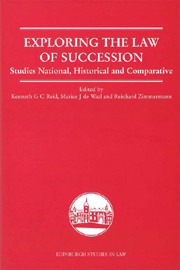Book contents
- Frontmatter
- Contents
- Preface
- List of Contributors
- List of Abbreviations
- Table of Cases
- 1 A Comparative Overview
- 2 Compulsory Heirship in Roman Law
- 3 Succession Law in Scotland – a Historical Perspective
- 4 Succession Law in South Africa – a Historical Perspective
- 5 Freedom of Testation and the Ageing Testator
- 6 Testamentary Conditions and Public Policy
- 7 Forfeiture Clauses and Events in Scots Law
- 8 Revocation of Wills by Changed Circumstances
- 9 Fideicommissary Substitutions: Scots Law in Historical and Comparative Perspective
- 10 The conditio si institutus sine liberis decesserit in Scots and South African Law
- 11 The New Dutch Law of Succession
- 12 Revocability of Mutual Wills
- 13 Succession Agreements in South African and Scots Law
- Index
4 - Succession Law in South Africa – a Historical Perspective
Published online by Cambridge University Press: 12 September 2012
- Frontmatter
- Contents
- Preface
- List of Contributors
- List of Abbreviations
- Table of Cases
- 1 A Comparative Overview
- 2 Compulsory Heirship in Roman Law
- 3 Succession Law in Scotland – a Historical Perspective
- 4 Succession Law in South Africa – a Historical Perspective
- 5 Freedom of Testation and the Ageing Testator
- 6 Testamentary Conditions and Public Policy
- 7 Forfeiture Clauses and Events in Scots Law
- 8 Revocation of Wills by Changed Circumstances
- 9 Fideicommissary Substitutions: Scots Law in Historical and Comparative Perspective
- 10 The conditio si institutus sine liberis decesserit in Scots and South African Law
- 11 The New Dutch Law of Succession
- 12 Revocability of Mutual Wills
- 13 Succession Agreements in South African and Scots Law
- Index
Summary
INTRODUCTION
South Africa has been gifted a mixed legal system through the coalescence of principally Roman-Dutch law – the South African common law to this day – with English law. The modern South African law of succession is but one product of these diverse influences. The significant interaction between Roman-Dutch and English law with regard to succession upon death can justifiably be regarded as a prime example of the interplay between Civil Law and Common Law within South African private law. This chapter highlights such interplay through an exposition of the historical development of some key features of the South African law of succession.
SOUTH AFRICA: A BRIEF LEGAL-POLITICAL HISTORY
In 1652 the Vereenigde Geoctroyeerde Oost-Indische Compagnie (VOC), also known as the Dutch East India Company, took possession of the Cape of Good Hope as a refreshment station en route to the East. The Dutch ruled at the Cape for almost a century and a half until Britain, at war with France and fearing that the French might seize the Cape and hence gain control over the sea route to the East, occupied the Cape between 1795 and 1803. Roman-Dutch law had been introduced as the legal system at the Cape during the time of Dutch rule, and English legal influence at the Cape during the time of the first occupation was brief and came to an end altogether when Britain entered into a truce with France and agreed to restore most of her recent colonial acquisitions. The Cape was duly returned to the Batavian rulers of the Netherlands.
- Type
- Chapter
- Information
- Exploring the Law of SuccessionStudies National Historical and Comparative, pp. 67 - 77Publisher: Edinburgh University PressPrint publication year: 2007



